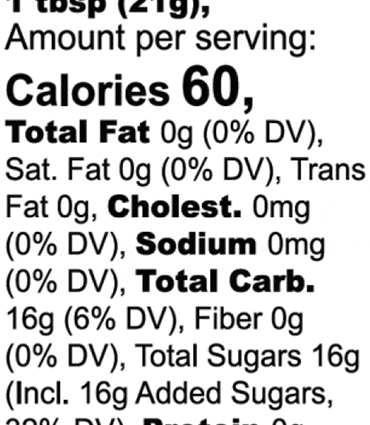Nutritional value and chemical composition.
The table shows the content of nutrients (calories, proteins, fats, carbohydrates, vitamins and minerals) per 100 grams edible part.
| Nutrient | Quantity | Norm** | % of the norm in 100 g | % of the norm in 100 kcal | 100% normal |
| Calorie value | 135 kCal | 1684 kCal | 8% | 5.9% | 1247 g |
| Proteins | 0.99 g | 76 g | 1.3% | 1% | 7677 g |
| Fats | 0.29 g | 56 g | 0.5% | 0.4% | 19310 g |
| Carbohydrates | 21.4 g | 219 g | 9.8% | 7.3% | 1023 g |
| Alimentary fiber | 10.6 g | 20 g | 53% | 39.3% | 189 g |
| Water | 65.4 g | 2273 g | 2.9% | 2.1% | 3476 g |
| Ash | 1.32 g | ~ | |||
| Vitamins | |||||
| Vitamin A, RE | 6 μg | 900 μg | 0.7% | 0.5% | 15000 g |
| beta Carotene | 0.068 mg | 5 mg | 1.4% | 1% | 7353 g |
| Vitamin B1, thiamine | 0.012 mg | 1.5 mg | 0.8% | 0.6% | 12500 g |
| Vitamin B2, riboflavin | 0.099 mg | 1.8 mg | 5.5% | 4.1% | 1818 g |
| Vitamin B4, choline | 8.8 mg | 500 mg | 1.8% | 1.3% | 5682 g |
| Vitamin B5, pantothenic | 0.041 mg | 5 mg | 0.8% | 0.6% | 12195 g |
| Vitamin B6, pyridoxine | 0.087 mg | 2 mg | 4.4% | 3.3% | 2299 g |
| Vitamin B9, folate | 3 μg | 400 μg | 0.8% | 0.6% | 13333 g |
| Vitamin C, ascorbic | 0.3 mg | 90 mg | 0.3% | 0.2% | 30000 g |
| Vitamin E, alpha tocopherol, TE | 0.36 mg | 15 mg | 2.4% | 1.8% | 4167 g |
| Vitamin K, phylloquinone | 4.9 μg | 120 μg | 4.1% | 3% | 2449 g |
| Vitamin PP, NE | 0.162 mg | 20 mg | 0.8% | 0.6% | 12346 g |
| Betaine | 0.4 mg | ~ | |||
| Macronutrients | |||||
| Potassium, K | 59 mg | 2500 mg | 2.4% | 1.8% | 4237 g |
| Calcium, Ca | 460 mg | 1000 mg | 46% | 34.1% | 217 g |
| Magnesium, Mg | 39 mg | 400 mg | 9.8% | 7.3% | 1026 g |
| Sodium, Na | 13 mg | 1300 mg | 1% | 0.7% | 10000 g |
| Sulfur, S | 9.9 mg | 1000 mg | 1% | 0.7% | 10101 g |
| Phosphorus, P | 9 mg | 800 mg | 1.1% | 0.8% | 8889 g |
| Trace Elements | |||||
| Iron, Fe | 3.55 mg | 18 mg | 19.7% | 14.6% | 507 g |
| Manganese, Mn | 0.142 mg | 2 mg | 7.1% | 5.3% | 1408 g |
| Copper, Cu | 112 μg | 1000 μg | 11.2% | 8.3% | 893 g |
| Selenium, Se | 0.2 μg | 55 μg | 0.4% | 0.3% | 27500 g |
| Zinc, Zn | 0.25 mg | 12 mg | 2.1% | 1.6% | 4800 g |
| Digestible carbohydrates | |||||
| Starch and dextrins | 0.24 g | ~ | |||
| Mono- and disaccharides (sugars) | 20.87 g | max 100 г | |||
| Glucose (dextrose) | 1.58 g | ~ | |||
| sucrose | 1.72 g | ~ | |||
| fructose | 17.57 g | ~ |
The energy value is 135 kcal.
Agave cooked rich in vitamins and minerals such as: calcium – 46%, iron – 19,7%, copper – 11,2%
- Calcium is the main component of our bones, acts as a regulator of the nervous system, participates in muscle contraction. Calcium deficiency leads to demineralization of the spine, pelvic bones and lower extremities, increases the risk of osteoporosis.
- Iron is a part of proteins of various functions, including enzymes. Participates in the transport of electrons, oxygen, ensures the course of redox reactions and activation of peroxidation. Insufficient consumption leads to hypochromic anemia, myoglobin-deficient atony of skeletal muscles, increased fatigue, myocardiopathy, atrophic gastritis.
- Copper is a part of enzymes with redox activity and involved in iron metabolism, stimulates the absorption of proteins and carbohydrates. Participates in the processes of providing the tissues of the human body with oxygen. The deficiency is manifested by disorders in the formation of the cardiovascular system and skeleton, the development of connective tissue dysplasia.
Tags: calorie content 135 kcal, chemical composition, nutritional value, vitamins, minerals, what is the use of cooked agave, calories, nutrients, useful properties of cooked agave










